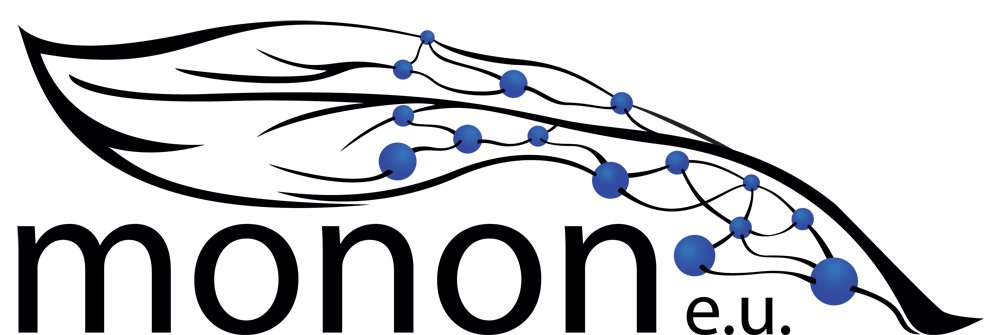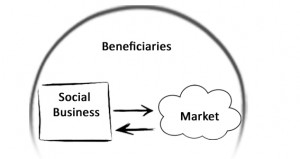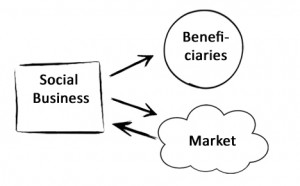Social Business Types
While working with start-ups I’ve experienced two types of approaches to design a social business: Either the business plan is following a good old schoolbook approach and often risks running short in terms of the impact it is making: it’s well developed in terms of the production process, product design and the marketing strategy, but it lacks the social component, which makes it a social business. An organizations complex relations with stakeholders are simplified, which reduces the potential impact it could have.
The second type of start-up tries to face this complexity, yet while drafting the business plan they often run the risk of being overwhelmed by what all should be done as a social business: democratic working conditions, cradle to cradle productions, socially fair pricing system and environmentally friendly distribution all at the same time, can become discouraging.
Social Business Types can help both types of entrepreneurs to deal with the complexity of today’s economy during the different phases of establishing their new organization. It helps to put a focus on the essential aspects of their social business, where they should perform high to justify that they call themselves a social business, while it highlights those stakeholders and actions, which would be desireable, yet are not crucial for creating the intended impact.
A social business is described by many authors (i.e. Yunus, Alter) through the fact, that it is mission based. In other words: the primary reason for existence is to improve the livelihood of a certain group in society, which i would like to call beneficiaries henceforth. Based on the approach of the common good economy and its focus on stakeholders as well as on Kim Alter's Social Enterprise Typology I have developed a basic structure of 5 social business types. The main difference between them is the way the beneficiaries are involved in the organization. Accordingly one characteristic is to consider, as which stakeholder-group these beneficiaries are involved in the (future) social business.
Type A - Customer Oriented Social Business
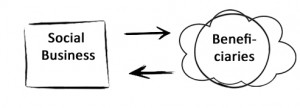
In the first type, Type A customer oriented social business, the beneficiaries are the ones who buy, purchase, use or consume the good or service provided by the organization. This group is not only directly influenced by consuming or using the product or service of a company but shaped by the way how, when and where they are provided with the service and product. If they can participate in designing the product, if packing material can be recycled by the producer, if the product fulfills a basic need and in how far the product encourages a healthy and sustainable lifestyle are further aspects of the positive social impact.
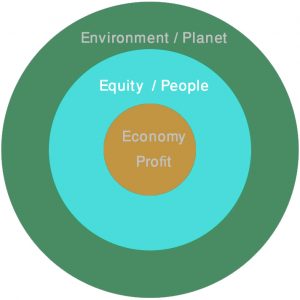
To sum it up: In a customer oriented social business the business works towards creating an impact on the beneficiary through providing them (or their closed family members) with a product or a service, which can ease their problem. Especially in the global south, the beneficiaries/customers are often low-income clients and the social business is providing them with access to basic goods and services.
A Type A Social Business is referring therefore on the social dimension of sustainability and social inclusion in market transactions becomes one of the core reasons for its existence.
Type B - Employee Oriented Social Business

The second Type, Type B employee oriented social business, is focused on its employees, workers and also the working shareholders. Said in other words: everybody who earns his or her living from providing their labor time (not the product of his work efforts, which would be type C) to the business. A business’ impact derives not only from the financial compensation the individual is provided for his or her working time but also from the inclusion decision making, the workplace safety, educational possibilities, work time agreements and the degree to which precarious day labour and jobs are replaced by more secure monthly paychecks.
While Type A includes the beneficiaries as customers, type B tries to increase their status through giving them employment. Yet, not every business which provides employment to somebody else is a social business: the social business should provide employment to people which would not find employment otherwise or include employees in a more democratic and egalitarian way in activities, then other companies from that particular sector do. While making a business plan for a social business which hire hard-to-employ people, the social business has to adopt the business processes according to the particular situation of the employees, such as providing special training (in case of under-qualified work force) or to adopt working place or working time to the requirements of the employees (as i.e. in the case of single mothers or blind people).
Same like a type A Social Business also a type B Social Business is focused on the social dimension of sustainability, where the betterment of the beneficiaries' situation should be reached by social inclusion in the labour market and production process.
Type C - Supplier Oriented Social Business
The third group of social businesses includes organizations, which focus is on improving the situation of providers of raw material, products or services. Again: not every business which receives supplies is automatically a Type C Social Business. Similarly it is characterized by the fact, that those suppliers (the beneficiaries) can be considered a vulnerable group or a group in a particular disadvantaged situation.,This could be for example small farmers or other small and micro-sized producers, which are due to their size endangered to be exploited. A subcategory would be that the social business works with bigger suppliers, which in turn employ those disadvantaged groups. In both cases a supplier oriented social businesses should be characterized by setting way higher sectoral standards to the social and environmental standards of their suppliers and have a closer relationship with their suppliers than other organizations.
The first type of Type C social business are concerned with the socio-economic situation of small suppliers (i.e. small farmers) and are supporting those through providing them with a better network, trainings and similar measures, which go way beyond the financial transaction of supplier and customer. In my experience this category is dominating in those countries, where the economy is still in pre-industrial stage, where one can find many small farmers, without business acumen. The second category we can find in industrialized countries and are trading and production firms, with the target to provide typical consumer goods, but from socially and economically more sustainable and reflective sources. This category often exists as a hybrid form of Type C and Type D.
Type C social businesses focus on both the social as well as the environmental dimension of their suppliers, where for the first category the social dimension is clearly dominant.
Type D - Environmentally Oriented Social Business
This fourth group of social business is less defined through a particular social group, but through the fact, that the ecological aspects of the business are in the focus of attention. Therefore all or a bigger indefinable group is benefiting from a cleaner and more healthy environment as well as less pollution.
Some Social Businesses in this category, we would refer to as grass roots. They try to achieve the higher environmental sustainability by going back to the roots and providing or producing products and services with less or local resources (i.e. local made cookies rather than industrial produced ones; upcycling and repair-cafés) or developing new more sustainable business models to provide alternatives (i.e. food coops rather than supermarket). Again other Type D Social Businesses try to solve the environmental challenge through applying technology, by using internet platforms for sharing of resources or develop machines or tools to bypass the often unsustainable patterns of the dominant economy (i.e. Fairphone or Livin Farms).
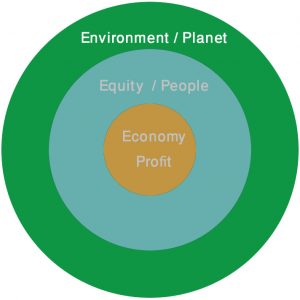
While the other for types of social businesses are more often focused on the social aspect of sustainability, Type D social businesses are primarily on the environmental / planet layer of sustainability. Managing resources more carefully, avoiding garbage and pollution and promoting more sustainable life styles, which reduce the ecological footprint of the customer is in the focus of attention. Very often Type D Social Businesses are hybrids forms merging in elements of type A customer oriented social businesses or Type C supplier oriented social businesses.
Type E - Socially Oriented Social Business (or service subsidization Social Businesses)
This last group of Social Businesses is holding organizations, which focus on beneficiaries, which cannot be involved as any of the stakeholder given above in the business process, but are in distress and need access to certain social service or products. The beneficiaries are often characterized by a lack of purchasing power as well as a lack of the ability to provide their work time, so that they canparticipate neither in the production nor in the consumption cycle, such as children or heavily disable people.
In a Type E Social Business a profitable (while of course socially and environmentally friendly) business is established (i.e. a restaurant). The monthly profits are to 100 % (!) reinvested in the business as well as used for social activities. A high degree of transparency as well as democratic structures should be in place to ensure, that the funds are used in an appropriate and fair manner and for the intended purpose. We find this social business model very often in countries, which lack a social welfare state or similar social democratic institutions, which would take care of providing services to such citizens through redistribution policies.
This type of Social business again focuses on the social aspect of sustainability with a focus on the inclusion of individuals, which are not able to participate in the market to still have access to fundamental services and products.
